Pakistan is home to some of the most famous and largest mosques in the world, with some dating back to the 17th century.
These sacred structures have since turned into monuments of national importance that do not only depict the region’s rich history but also pay homage to the Islamic traditions and cultural heritage of South Asia.
Here are some of the most majestic and largest mosques in Pakistan in terms of area, accessibility and capacity.
1. Faisal Mosque, Islamabad
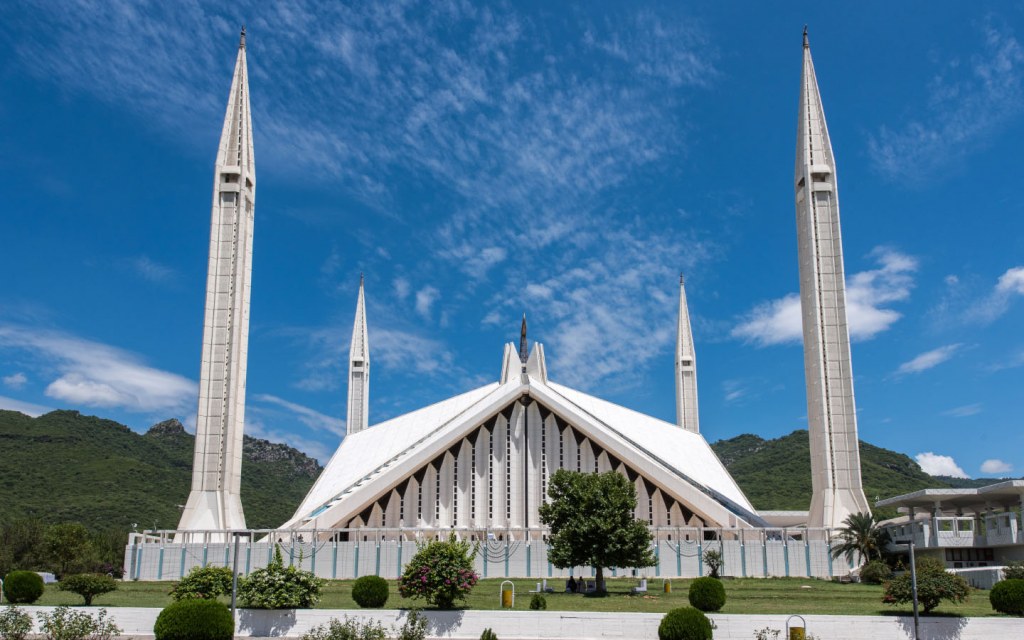
Location: Shah Faisal Ave, E-8, Islamabad.
Named after the late King Faisal bin Abdul Aziz of Saudi Arabia, Faisal Mosque in Islamabad is considered to be the largest mosque in South Asia. It is also the fourth largest mosque in the world.
The mosque, which was built on an elevated area against the breathtaking backdrop of the famous Margalla Hills, is perceived as the National Mosque of Pakistan. It is also one of the most popular tourist attractions in the federal capital.
A Turkish architect named Vedat Dalokay designed Faisal Mosque after winning an international competition. The competition had recevied 43 proposals from 17 different countries.
An incredible blend of modern and traditional architecture, the geometric shape of the Faisal Mosque is said to have been inspired by the tents set up by desert Bedouins.
This stunning mosque is surrounded by four thin Turkish-style minarets and has a vast marbled courtyard with porticoes. Moreover, unlike most traditional mosques, Faisal Mosque lacks a dome – a fact that drew criticism during the initial stages of its construction.
With a grand Turkish chandelier hanging in the centre along with intricate calligraphy and beautiful mosaic on the walls of the main tent-shaped hall, the interior of this famous mosque is just as stunning. It is also one of the most Insta worthy places in Islamabad.
Faisal Mosquecan hold almost 1 lac people while the adjoining grounds can hold approximately 2 lac more.
However, it is important to mention that Faisal Mosque is soon expected to lose its status as the biggest mosque in Pakistan to the Grand Jamia Mosque. Also known as Bahria Town Jamia Masjid Complex, Grand Jamia Mosque is currently under construction in Karachi.
2. Badshahi Mosque, Lahore
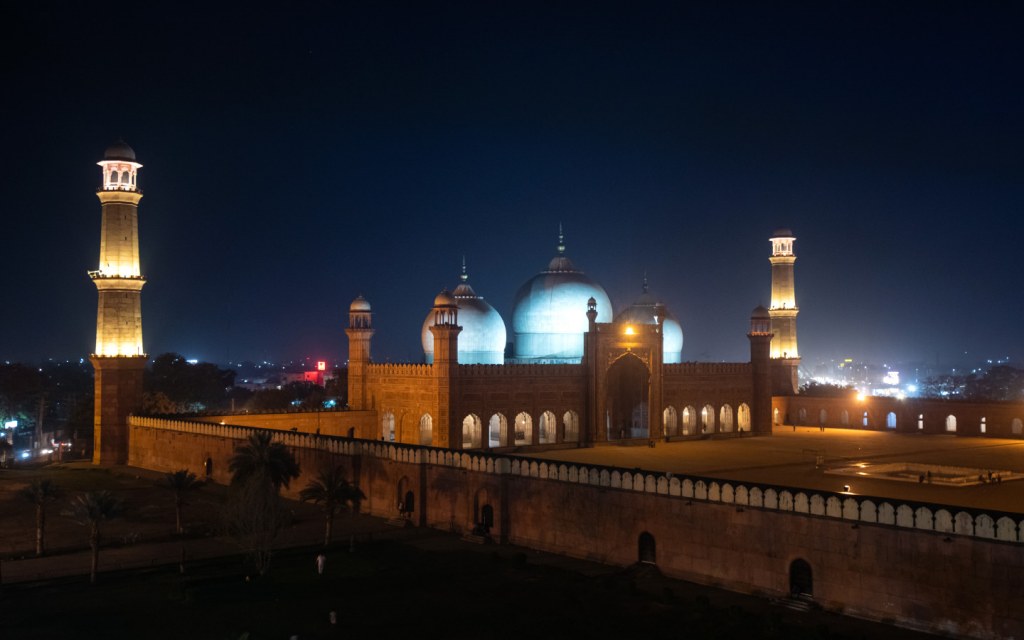
Location: Walled City, Lahore.
Badshahi Mosque, a majestic religious monument constructed during the long rule of Mughal Emperor Aurangzeb, is the second largest mosque in Pakistan. It has the capacity to hold approximately 1 lac visitors at a time.
Located in the heart of Lahore, the imperial mosque was built adjacent to the Lahore Fort. The emperor constructed it on an elevated platform to prevent the structure against flooding, as River Ravi once flowed alongside its northern end. The Alamgiri Gate connects the mosque to the fort.
The grand scale of Badshahi Mosque illustrates the grandeur and intricacies of the Mughal architecture. It is one of the major tourist attractions in Lahore.
The symmetrical design of the mosque appears vastly influenced by the Jamia Mosque in New Delhi, India. Aurangzeb’s predecessor and father, Emperor Shah Jahan, had commissioned that mosque.
There are four minarets around the prayer hall and an additional four minarets on each corner of the mosque’s vast courtyard. Meanwhile, the walls and ceilings of the mosque are embellished with gorgeous stones, extravagant marble work, mosaic art and beautiful murals.
Badshahi Mosque saw some extensive damage during the British rule. However, it was restored to its former glory in the 1960s. Currently, the premises of the mosque houses vast gardens, fountains, Huzoori Bagh Baradari, the tomb of Dr Allama Iqbal, British-era Roshnai Gate and the tomb of Sir Sikandar Hayat Khan along with a small building that displays sacred Islamic relics, including the hairs of Prophet Mohammed (SAW).
3. Grand Jamia Mosque, Lahore
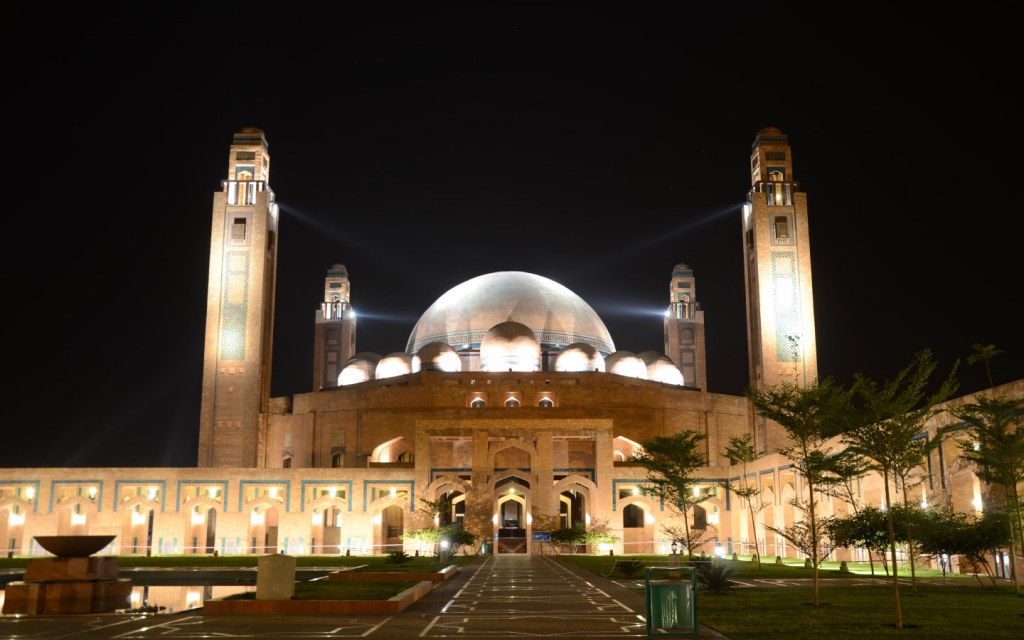
Location: Bahria Town Main Blvd, Juniper Block Sector C, Bahria Town, Lahore.
Grand Jamia Mosque is a recent addition to the list of largest mosques in Pakistan. Located in Bahria Town Lahore, the most popular gated-community in the city, this mosque has also become a major tourist attraction.
It is a breathtaking masterpiece that perfectly blends contemporary architecture with traditional design. Currently the seventh largest mosque in the world, the Grand Jamia Mosque has the capacity to hold nearly 1 lac people in its main hall and in the adjoining courtyard.
One of the most famous mosques in Lahore, Grand Jamia was inaugurated in 2014. It has a Grand Dome that is about 40 feet tall. The structure is surrounded by 20 smaller domes and four minarets that are 165 feet tall. The exterior of the mosque, though unique, appears to be inspired by Badshahi Mosque in Lahore.
Moreover, custom-made Turkish carpets, splendid Persian chandeliers and extravagant artwork influenced by traditional Persian, Central Asian, Arabic and Turkish designs adorn the interior of the mosque.
Meanwhile, the entire exterior of the mosque has been embellished with delicate handmade tiles made from special clay. Each 2.5-inch tile was carefully placed on the outer wall by hand. A stunning Islamic art gallery and a religious school have also been constructed on the premises.
Famous Lahore-based architect Nayyar Ali Dada & Associates designed the beautiful Grand Jamia Mosque.
4. Shah Jahan Mosque, Thatta
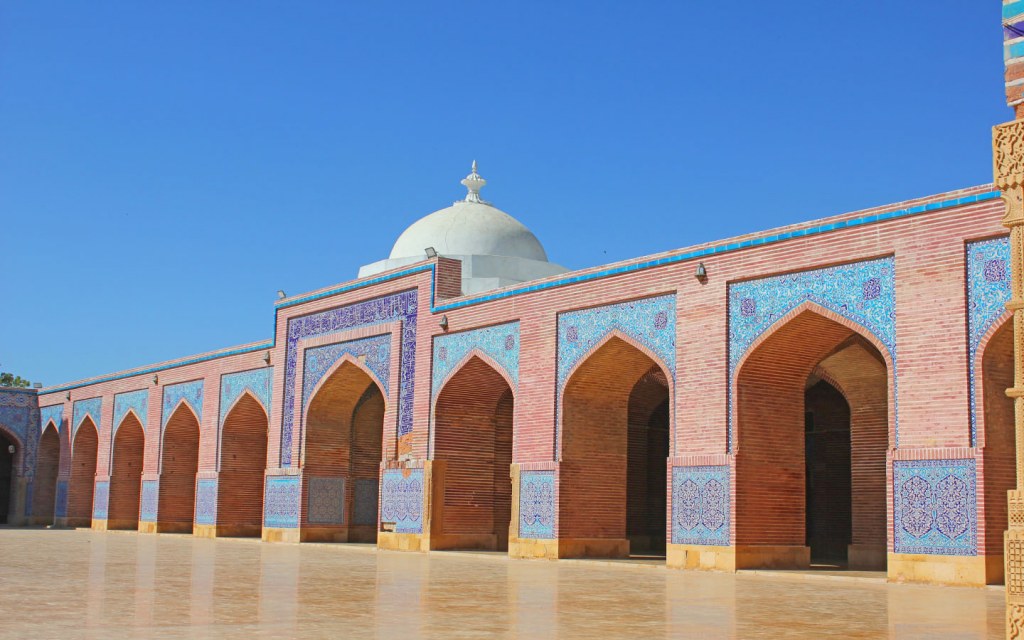
Location: Thatta town, Thatta.
Yet another beautiful monument built during the Mughal era, the historic Shah Jahan Mosque in Thatta, the ancient capital of Sindh, is a sight to behold. Emperor Shah Jahan commissioned this mosque in the 1640s. It was a gift to the people of Sindh, showing the king’s gratitude for their hospitality.
The condition of Thatta has dilapidated in the last few decades. Broken roads and old, crumbling buildings tell the tale of ignorance and lack of maintenance. However, the mosque is still in relatively better shape.
Built upon a stone plinth, the exterior of the mosque consists of red bricks along with blue-and-white tiles carefully crafted in Hala, another town in Sindh known for its incredible textile work and handicrafts. Unlike traditional mosques, this Mughal-era mosque doesn’t have a single minaret – although it does have 33 arches and 93 domes. That’s the largest number of domes in any mosque in Pakistan. These domes also have an interesting anecdote attached to them. A board near the tourist attraction claims the mosque has 100 domes. However, the locals say it’s impossible to count all of them without losing track of the total number.
Moreover, the acoustics in this mosque is extraordinary. You can clearly hear the muazzin giving adhan on one end of the mosque on the other end without any loudspeaker. This grand mosque in Thatta can hold up to 20 thousand people at a time.
5. Masjid-e-Tooba, Karachi
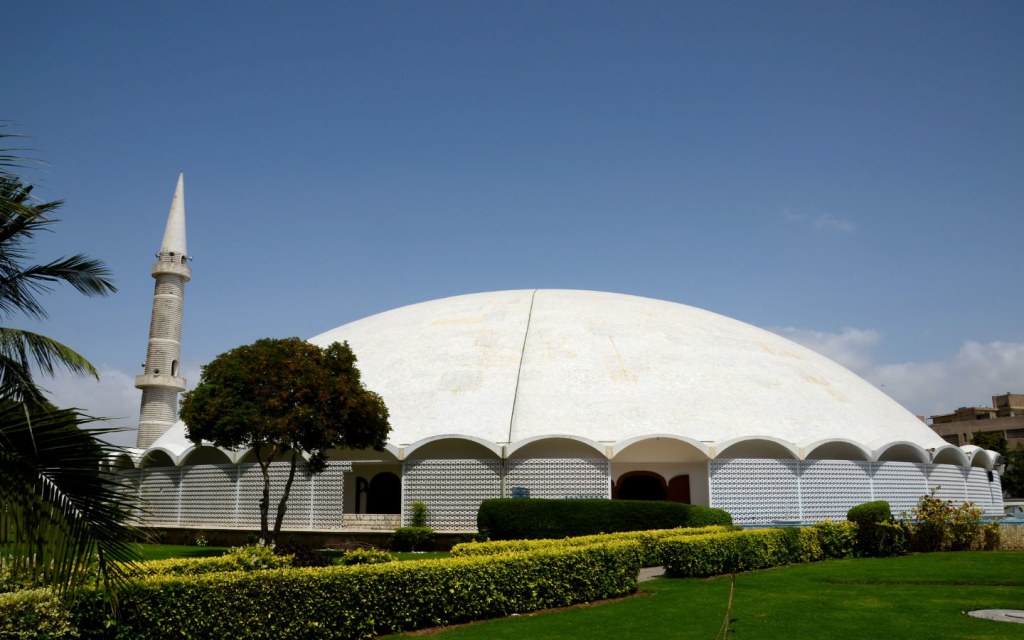
Location: Old Korangi Rd, Sabir SRE Karachi Cantonment, Karachi.
The beautiful Tooba Mosque is commonly referred to as ‘Gol Masjid’ after its unique appearance. It is located in Defence Housing Authority Phase 2 in Karachi.
Constructed in 1969, this mosque is a major tourist attraction in Karachi. Moreover, it is also considered the largest single dome mosque not only Pakistan but in the entire world. Dr Babar Hamid Chauhan and Zaheer Haider Naqvi, who worked as an architect and an engineer respectively, designed Masjid-e-Tooba.
Tooba Mosque has one giant dome that is 212 feet in diameter and 5148 feet in height. The structure has no middle pillars or archways. Interestingly, unlike most mosques, it only has only one minaret that stands tall at 120 feet. The exterior of the mosque comprises of pure white marble. Meanwhile, the interior has an elegant display of glass mirrors with beautiful onyx pieces embellished on the retaining wall.
The primary prayer hall can accommodate five thousand people at once. Whereas the outer terrace and lawn can hold an additional 25 thousand visitors.
6. Mahabat Khan Mosque, Peshawar
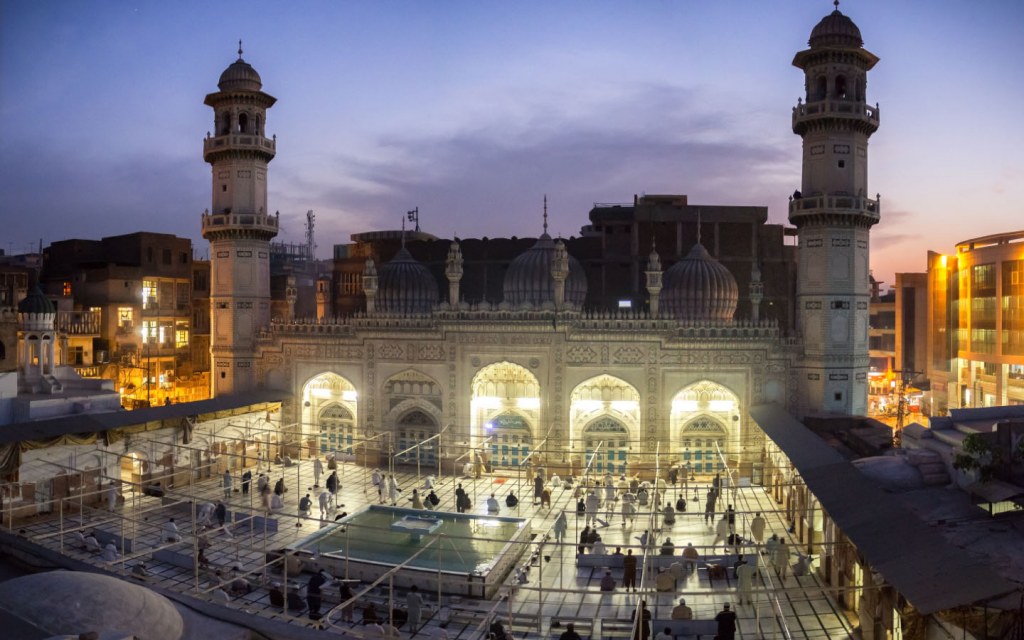
Location: Andar Shehr, Mohallah Baqir Shah, Peshawar.
Another remarkable reminder of the splendour of the Mughal empire, the pure white Mahabat Khan Mosque is named after the then-Mughal governor of Peshawar Nawab Mahabat Khan. He had served under both Emperor Shah Jahan and his son, Emperor Aurangzeb.
Often mispronounced as ‘Mohabbat Khan,’ this mosque is undoubtedly one of the most popular tourist attractions in Peshawar. Nearly 14 thousand people can pray inside this famous mosque and the adjoining courtyard at a time.
Built in the 1630s, Mahabat Khan Mosque has a huge prayer hall with five arched entryways capped by three domes. Six small decorative minarets were built on top of the main hall with two tall minarets flanking the structure. The ceiling of the mosque has been decorated with breathtaking floral and geometric motifs. Meanwhile, the exterior of the mosque is made of elegant white marble.
Mahabat Khan Mosque has a vast courtyard with a pool for ablution constructed in the centre and a row of rooms built on the side.



